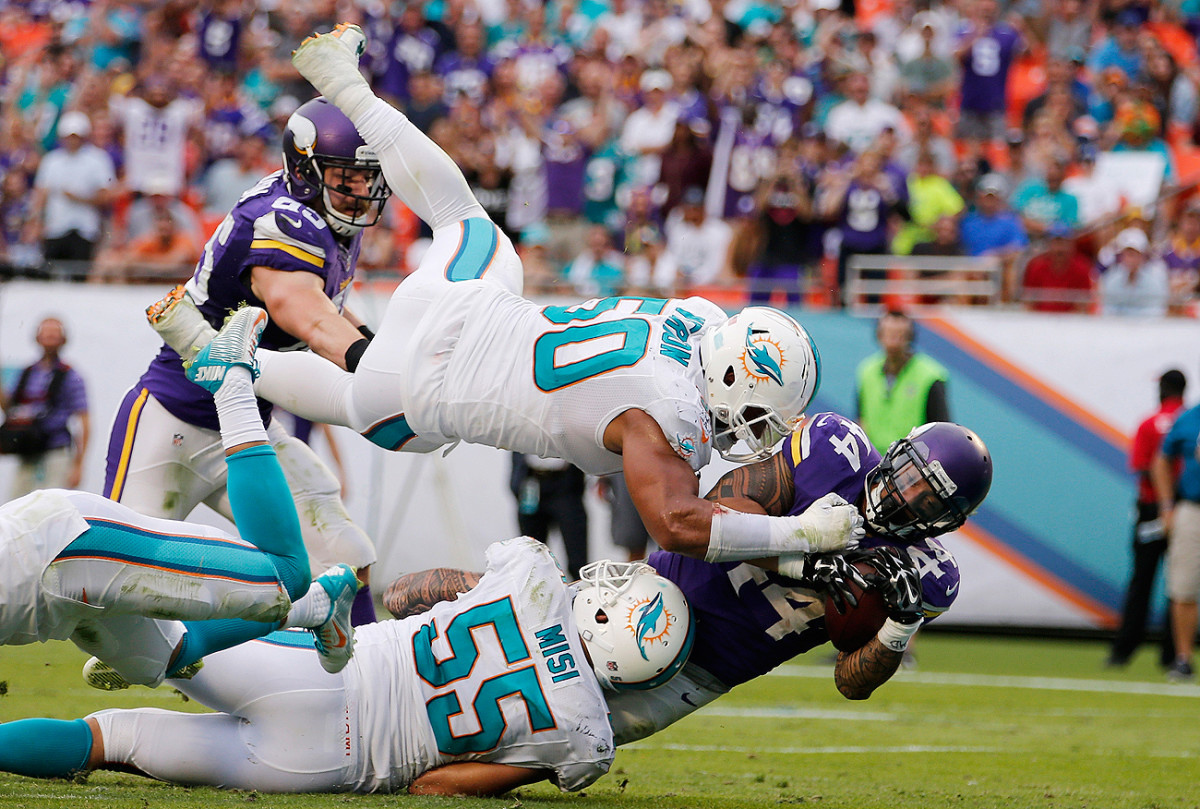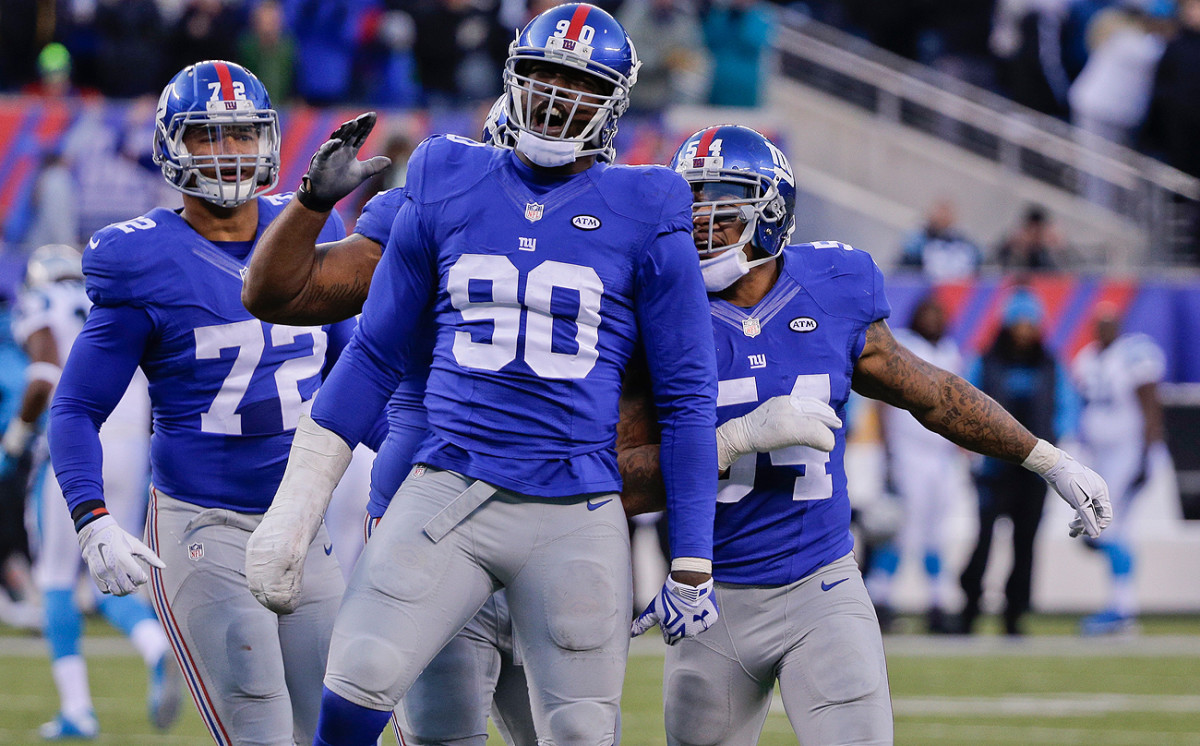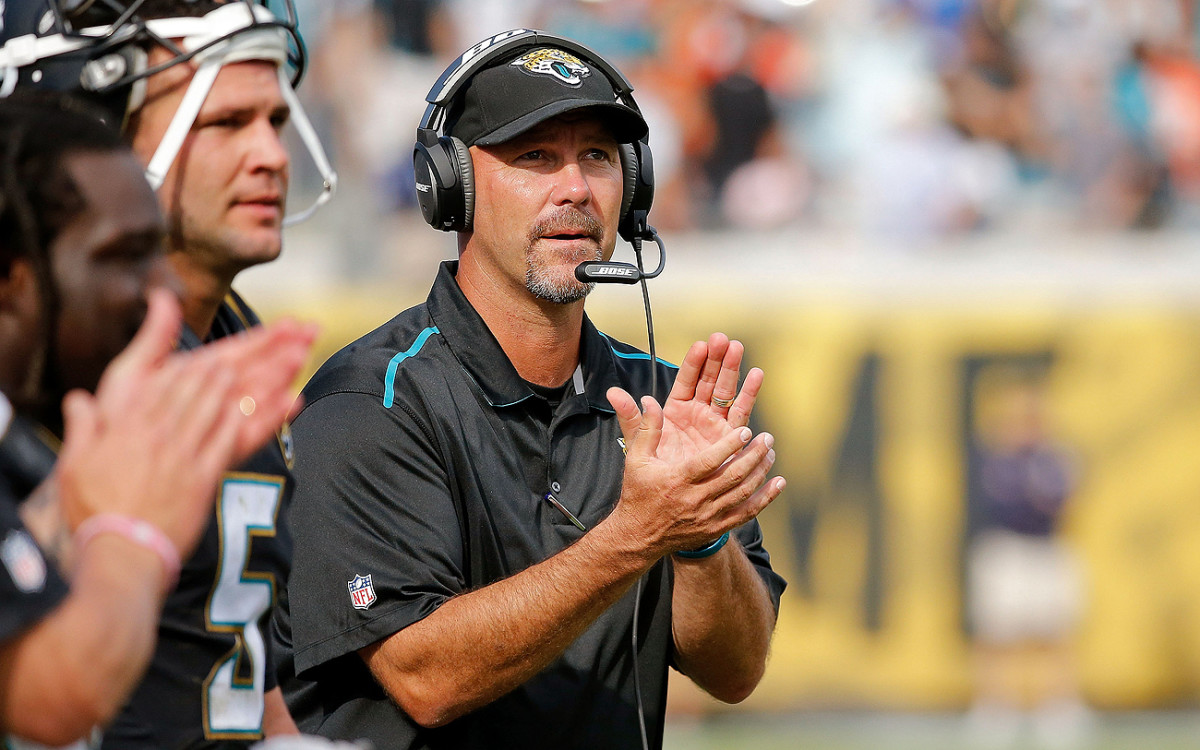Giant Surprise: How Vernon’s $85 Million Deal Went Down

With additional reporting by Kalyn Kahler of The MMQB.
On the craziest opening day of free agency since 2009, when Washington paid big bust Albert Haynesworth like he was Peyton Manning, the contract that shocked the NFL world Wednesday was handed to a quiet kid who was born in Miami, played high school football in Miami, played college football at Miami and played his first four pro seasons with Miami.
The Giants paid Olivier Vernon the richest contract for a defensive end in NFL history: five years, $85 million, with a bigger guarantee ($52.5 million) than J.J. Watt got two years ago.
In his first four professional seasons with the Dolphins, Vernon made $3.68 million. In his first year with the Giants, he’ll make $29 million.
“Despite the possible chance of snow, I think I’ll be okay,” Vernon told The MMQB Wednesday night. “I wouldn’t mind trying to shovel it myself.”
The start of free agency was ridiculously irresponsible across the league. You know it’s nuts when the unproven Brock Osweiler turns down $16 million a year from the defending Super Bowl champions to make $18 million a year with Houston. But this was a desperation day for the Giants. Under-fire GM Jerry Reese committed $147 million to four free agents. And the craziest deal was paying starting-quarterback money to Vernon, a former third-round pick who averaged half a sack per game in his first four seasons. Vernon’s deal will pay him an average of $17 million a year.
It’s a deal that agent David Canter, negotiating from his home in Davie, Fla., foresaw last week. If you said a few days ago that Olivier Vernon was about to break the bank for defensive ends, the free world would have laughed. Or had you committed. But on March 2, Canter said he wrote himself notes in his phone projecting Vernon’s deal thusly:
• $80 million over 5.
• $45 million guaranteed.
• $45 million first three years.
• $50 million i.o. (“I.O.” means how much of the deal would be guaranteed for “injury only.”)
Agents are notoriously greedy. Canter was at the combine two weeks ago, and on the phone since, swearing to whomever would listen that Vernon was going to strike it very rich. Fifteen million a year, maybe. Or $16 million.
Canter got Vernon $17 million a year.
He beat his goals in total contract (by $5 million), by total in the first three years (by $9 million) and by total guaranteed (by $7.5 million).
And it all happened in seven dizzying hours.
* * *

Wednesday, 9:32 a.m.
Vernon, the 25-year-old prize prospect of the Dolphins, was given the transition tag by Miami before free agency, meaning the team would keep him for one year and $12.7 million unless another team outbid the Dolphins for him and Miami chose not to match. And now, six-and-a-half hours before free agency begins, Miami executive VP Mike Tannenbaum is calling Canter after the team had signed free-agent pass-rusher Mario Williams. Canter is expecting the call.
• MOCK DRAFT MOVES: Robert Klemko on how free agency is shaking up the top of the 2016 draft board
“We’re gonna take the tag off,” Tannenbaum tells Canter, meaning the Dolphins were rescinding the transition tag and making Vernon’s free agency unrestricted.
Relief. Canter knows some teams that love Vernon won’t sign him to a deal unless they know Miami won’t match.
Wednesday, 9:35 a.m.
Word leaks that Miami has rescinded the tag. The texts start pouring in to Canter, 43, a 20-year agent. In the legal tampering period, which began at mid-day Monday, no team had been allowed to try to entice Canter to have Vernon sign with them, because he was still property of the Dolphins. But now that Vernon has been cut free, teams can express interest to Canter and even talk parameters of a deal, though they can’t firmly agree to terms and sign the contract until the market officially opens at 4 p.m. Eastern time. Dallas, Chicago, San Francisco, Oakland, Jacksonville, the Giants and the Jets sniff around. And more.
“I’d gotten 30 to 50 texts from teams asking me to tell them when the tag came off,” Canter says. Now that it is, the real feelings of teams will come out when agent and team talk money.
Wednesday, 2:30 p.m.
Three teams separate from the pack: the Jaguars, Giants and Jets. By the time Vernon and his parents arrive at Canter’s house, the agent, juggling deals for several clients, knows Vernon is going to make significantly more than the $12.7 million he’d been promised under the transition tag.
“Dude,” says Canter, “you’re going to make $75 to $85 million here.”
“I know,” says Vernon, coolly.
“Nervous?” Canter asks.
“No,” says Vernon.
“Could be a tough decision for you,” Canter says.
“Okay,” says Vernon.
“The excitement of being a New York Giant—there was something sexy about New York that there wasn’t in Jacksonville,” Canter says. “And I could see that in Olivier.”
The one issue that is important to Canter—other than dollars—is length of contract. The Giants and Jets are willing to give Vernon a five-year contract. Jacksonville prefers a six-year deal. Why is five preferable? Simple: Canter wants Vernon to be able to have one more big negotiating chance. If he signs a five-year contract, he’ll be a free agent again at 30—and 30 is better, younger, than 31.
This is offset, a bit, by the fact that Jacksonville can offer a deal with no state income tax. In a $50 million deal, for instance, this will be worth about $6 million.
On the other hand, Vernon thinks it would be fun to try a new life, income tax be damned. New York is the big city. Jacksonville is, well, Jacksonville. “I’ve been in Miami all my life, 25 years,” says Vernon. “It was like, I know New York is probably a little more faster-paced, but I am a city guy myself, and I think it will probably be a little better for me than Jacksonville. I don’t know if I would have been comfortable in Jacksonville, just with the whole environment. It’s a beautiful city. I’ve been there, I’ve played there twice, but I just don’t know if I would have been comfortable over there.”
But by 3:30 p.m., the offers get closer. Jacksonville drops the sixth year. The Giants, Jets and Jags are all at five years. Now it is getting interesting.

Wednesday, 3:45 p.m.
Giants negotiator Kevin Abrams gives Canter nearly what he wants in terms of dollars and guarantees. Matt Cassano, Vernon’s financial adviser, and Brian McIntyre, Canter’s director of analytics and right-hand man, study the Giants‘ latest offer closely. The New York deal is a year less than ones signed by former contractual defensive standard-bearers J.J. Watt and Justin Houston (both of whom signed six-year deals in the past 18 months). And the Giants are moving toward allowing Vernon to set the record for defensive-end guarantee, and for money paid in the first one, two and three years of a contract. Why is this important? Because even if a player were to disappoint a team and not produce at superstar level, there’s no way he’d be cut after a year, and almost certainly not after two. Canter wants this deal to be a record-setter through three years for Vernon, and also to show the world that a lesser player with big upside could make history the same way the great Watt had.
Sometimes an agent has the leverage in a deal. Canter knows he has it here, because he knows from this legal tampering period that the Jaguars, Giants and Jets badly want Vernon. What’s the worst that can happen when Canter says the deal’s going to come in at well over $15 million per year? One team, or more, drops out. And that’s what happens—the dizzying cash total causes the Jets to throw in their cards here. They don’t want to pay Vernon more than $15 million a year. But the Jags and Giants are still in.
Vernon had spoken to fellow Floridian and current Giant Jason Pierre-Paul the previous night, and he’d given a glowing report about playing in New Jersey. And Canter can read his client. “The excitement of being a New York Giant—there was something sexy about New York that there wasn’t in Jacksonville, and I could see that in Olivier,” Canter says. “But give credit to Jacksonville. They were moving mountains to try to make this work.”
Perhaps not quite fast enough. Or not by enough dollars. As decision time nears, Jacksonville’s best offer, in cash, is $7 million less than New York’s in 2016. And there is more deferred money and slightly less guaranteed money. Five-year deals in the NFL aren’t totally guaranteed, and the Giants’ guarantees mean a lot to Canter. Though Jacksonville’s total dollars are close, the early years are weighted in the Giants’ favor.
In all, the Giants’ final offer is a $20 million signing bonus, a guaranteed salary of $1.75 million in 2016, and a $7 million roster bonus effective March 13 (this Sunday), along with a guaranteed salary of $11.25 million in 2017, with workout bonuses of $250,000 each year, which Vernon plans to earn. His $12 million salary in 2018 is injury-guaranteed. Early in the league year of 2018, it will be fully guaranteed unless the Giants choose to cut Vernon. Effectively, this is a two-year, $41 million deal, with the Giants able to keep or cut Vernon in each of the last three years.
Lots of moving pieces here. The 4 p.m. opening of free agency, when teams can officially sign players, is approaching. Each teams has a few deals to make official. Canter knows each team might move to Plan B for an edge rusher if they fail to sign Vernon. So he’s not going to push the envelope much, fearful that one team or both might drop out. While the Jaguars hurriedly move money around to get competitive with the Giants, after the clock strikes 4, Canter suggests Vernon talk to both teams to get a feel for which one he might like best.
The Giants are first. At about 4:25 p.m., Vernon gets on the phone with Giants coach Ben McAdoo and then with defensive coordinator Steve Spagnuolo.

Wednesday, 4:46 p.m.
Jacksonville coach Gus Bradley is on the phone, trying to reach Vernon. But Vernon is still talking to the Giants.
When Vernon finishes his call with New York, Canter says Vernon needs to talk with Bradley and the Jaguars.
“I don’t need to talk to Jacksonville,” Vernon says.
Canter has seen the momentum swing toward the Giants, and he knows his soft-spoken client. Vernon wants the Giants.
“Congratulations,” Canter says. “You’re a New York Giant.”
Canter calls the Jags to tell them Vernon is going to sign with the Giants, and then he and Vernon call the Giants.
“This wasn’t a negotiation,’’ Canter says later. “This was an auction. It’s good in this business when that can happen. What I appreciated about this was this was two organizations really trying to win, who came hard after a player and got their ownership to support the effort they made. No fake, no fluff. They both tried really hard to get Olivier, and they did it the right way.”
To review, Canter’s goals for the deal:
• Vernon got $85 million over five years ($5 million over the goal).
• $52.5 million guaranteed ($7.5 million over the goal).
• $54 million first three years ($9 million over the goal).
• $52 million i.o., the injury-only guarantee ($2 million over the goal).
Sometimes, it comes down to timing. When NFL teams have $1 billion under the cap to spend, and when the Giants are desperate to be competent defensively, it’s possible for agent and player dreams to come true.
PODCAST: PETER KING ON MANNING, MANZIEL, MORE
* * *
Late Wednesday night, Olivier’s father, Lascelles Vernon, is leaving Canter’s house. The agent relays a question from a writer over the phone.
“Why did your son pick the Giants?” Canter asks.
“My son didn’t pick the Giants,” Lascelles Vernon says. “The Giants picked my son.”
• Question or comment? Email us at talkback@themmqb.com.
